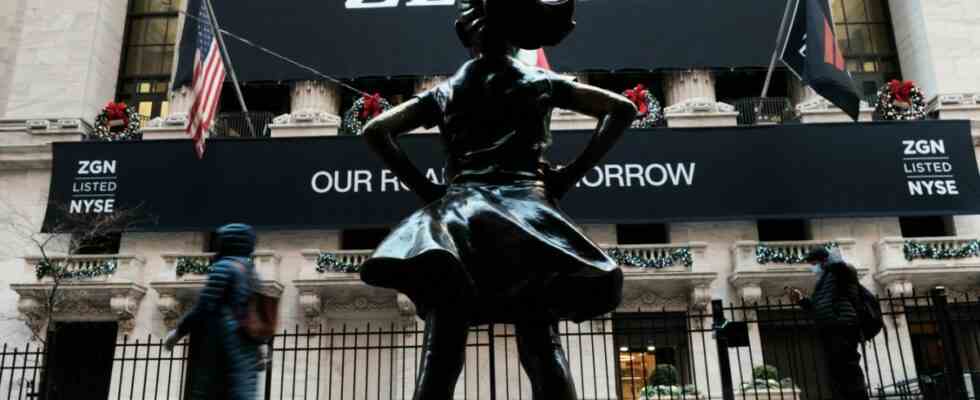The plans are grandiose, and it is no coincidence that Jean Pierre Mustier, previously head of Unicredit, chose the name Pegasus for his new stock exchange vehicle: The winged horse from Greek mythology gave the name and adorns the website, which of course also contains a a notice must not be missing from Mustier’s successful restructuring of the major Italian bank. With Pegasus, Mustier probably wanted to start again as an entrepreneur, first put on a stock exchange shell and then use it to buy a fast-growing financial company.
But now Mustier is probably running out of time, like at least they are Financial Times recently stated. If Pegasus doesn’t find a viable company by next spring, Mustier will probably have to liquidate the listed vehicle and return the money to its investors. That’s what the rules say.
Mustier isn’t the only celebrity banker who has dabbled in the stock market vehicle. The acronym Spac stands for “Special Purpose Acquisition Company” and seemed interesting for ex-top managers not only as a second career path. Also the former Commerzbank boss Martin blessingex-Credit Suisse boss Tidjane Thiam or Klaus Kleinfeldformer CEO of Siemens, are involved in the market.
First of all, Spacs are empty shells, investment companies that collect many hundreds of millions of euros from investors, although they initially have no business of their own, often only three to four employees, a website, but then a listing on the stock exchange. In return, they promise to buy a company within a maximum of two years, which will slip under the cloak of the stock market shell and in whose success or failure investors will then participate – ideally, investors can invest early and cheaply in a young company before many later is worth billions. In addition, investors get interest on their money as long as the Spacs had not yet found a takeover target, which was interesting at least in times of negative interest rates. If the Spac management proposes an unwanted company for takeover, investors can also vote against it and return their shares without loss. For the companies taken over, however, the matter should quickly and easily pave the way to the stock exchange. This is how the Italian men’s outfitter Ermenegildo Zegna managed to get listed on the New York Stock Exchange.
The unwinding wave follows the spac wave
It all sounded good at first, and indeed there has been a wave of Spac IPOs since 2021. Since 2020, more than 600 vehicles worldwide have collected 270 billion dollars from investors. In Europe it was only a fraction, but here, too, around eleven billion dollars have come together since 2020.
The worldwide stock market crash and the uncertain economic climate have meanwhile ended the boom. As interest rates rose, investors lost the advantage of being able to protect their money from negative interest rates in spac vehicles. There are more lucrative rates of interest elsewhere. Added to this is the stricter regulation by the stock exchange supervisory authority SEC, which primarily wants to protect private investors. Because time and again, start-ups have deceived investors.
Recently, not only has the number of new Spacs dropped rapidly, the many hundreds of vehicles already listed are also running out of time: They urgently need to find companies that roughly match what they have promised and who at the same time have owners who are willing to sell. For about half of the Spacs worldwide, the two-year deadline for an acquisition ends in the next twelve months. According to figures from Dealogic, of 66 Spacs that have gone public in Europe since the beginning of 2020, only thirteen have found a company, of which only eight deals have actually been closed.
World’s largest space gives up
Just this week even gave Bill Ackman, the founder of the world’s largest spac went looking for an object to buy: the hedge fund manager admitted that he hadn’t found a company that met his quality and return criteria. He will return the collected four billion dollars to the investors. Others managed to take over, such as the former Commerzbank boss Martin Blessing or the active professional investor Klaus Hommels. Blessing, however, only had a gaming company instead of a fintech, and Hommel’s holiday home broker Hometogo has lost almost 80 percent of its value since it went public a year ago. The Spacs may not have been a good investment for most investors, and many of the founders probably paid more.
But as always on the capital market, there were also beneficiaries. Above all, investment banks such as Credit Suisse, Citigroup and Goldman Sachs have earned billions from advising them on this. “Spacs will not replace normal IPOs,” says Berthold Fürst of Deutsche Bank. “But it will continue to exist as one instrument among many.” The federal government also wants to facilitate transactions with the stock exchange covers.
And maybe the “Mustier-Spac” Pegasus will take off after all. In any case, the ratings of many financial companies have recently fallen so much that Mustier may still find something cheap after all. The only question is whether the company owners will then also be willing to sell their business to a Spac.

